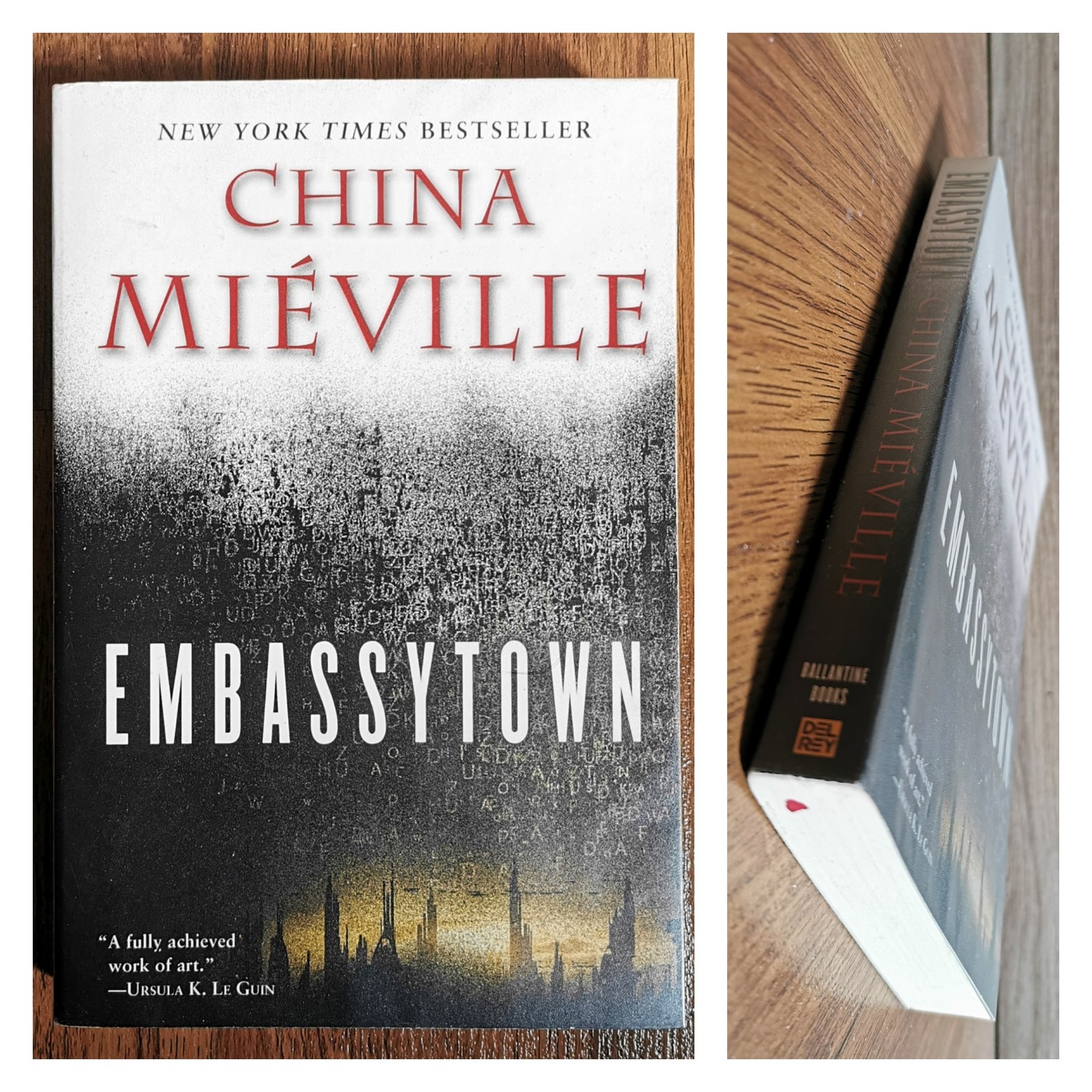We speak now or I do, and others do. You’ve never spoken before. You will. You’ll be able to say how the city is a pit and a hill and a standard and an animal that hunts and a vessel on the sea and the sea and how we are fish in it, not like the man who swims weekly with fish but the fish with which he swims, the water, the pool. I love you, you light me, warm me, you are suns.
You have never spoken before
I have a love-hate relationship with China Miéville. There are books of his that I absolutely adore (Perdido Street Station, The Scar, Un Lun Dun) and others I can do without (The City and the City, Railsea)—but one thing I cannot deny is the absolutely prodigous breadth of his imagination and originality. There is no author I know who can consistently put to page the unthinkable and unfathomable. He makes my mind feel small. Even without meaning to, I read almost every full length novel he had published and now, having completed Embassytown, I am only one book away from completing his entire canon.
Embassytown, in my opinion, is easily one of his best work and the thing about Miéville’s writing in general is that it is often scabrous, baroque, and toxic. You generally feel a little dirty after you read any book of his (particularly the Bas-Lag “trilogy”). It is like having your soul stained or getting radiation poisoning. Embassytown, in contrast, feels clean and even wholesome in parts. Relatively speaking, of course. It still gets very dark, because it’s Miéville, but Miéville channeling Ursula K. Le Guin, so it balances out.
There are very few works in sci-fi I can think of to compare Embassytown to, and the closest is Ted Chiang’s The Story of Your Life (which was adapted into Villaneuve’s 2016 film Arrival). It is perhaps a little reductive to call it a book about language; about communicating with alien beings, but that is the bone of it. It is also about semiotics, colonisation, religion, and exploration. I can draw equidistant parallels from this book to the story of Christ and his resurrection, and also to the Opium Wars.
The main extraterrestrial race in Embassytown is called the Ariekei, or the Hosts, as they graciously accepted and housed a human trading outpost on their world. The most succinct description in the book of the Ariekei is “insect-horse-coral-fan things” but what is most alien about them is the language they use (called simply the Language in the book). The Language appears to be an auditory one but the Ariekei uses sounds not as signifier of meaning, but rather as reference points that lead directly (somehow) to thought. The Ariekei speaks through tandem mouths making different sounds simultaneously, so it is impossible for any single human being to even vocalise it. When the human linguists tried to reproduce the sounds synthetically, using machines, the Ariekei perceive the product as meaningless, as there was no mind behind them.
The Hosts listened, and did not understand a single sound.
The Language with its paired vocals in the book is typographically represented like fractions though thankfully, Miéville only provided us with snippets or whole pages would look like the scribbles of a demented mathematician. And because speech is inseparable from thought and knowledge, the Ariekei cannot lie. Aside from the Ariekei and the Language, Embassytown is a goody bag of sci-fi elements: bizarre alien flora and fauna, intergalactic shortcuts through a dimension called the Immer where Lovecraftian horrors can manifest, biologically-based architecture and technology, unconventional relationship and familial models, etc. though they are not so pertinent to the story (except perhaps the idea of a bio-rigged living, breathing city that serves an allegorical role—the idea of walls literally growing ears is burned right into my brain now). It is not an easy book to consume and is in fact quite demanding of your attention and engagement. I cannot speak for everyone, but for me, it was well worth the effort.
Plus, you know you are reading a China Miéville novel when you encounter at least one word per chapter that you have never seen before, and you wonder whether it is a real word or if it is one of Miéville’s many made-up ones. He is the only author whose books I need to read with the help of a dictionary. I don’t believe he does it to obfuscate or to show off, but for precision.
Embassytown is a lot less dystopian and scummy compared to most Miéville settings, and a congenial space-faring settlement where humans coexist and trade good-naturedly with the Areikei and other alien races is quite pleasant to read about, and I would happily read an entire novel just learning about its interlocking cultures and its heterogenous inhabitants. The story is told from the perspective of a human Immerser (someone gifted and trained with the skills to navigate the Immer) named Avice who grew up in Embassytown, left it, and returned. Avice is part of the Language. To be more specific, she is a simile.
‘I don’t want to be a simile anymore,’ I said. ‘I want to be a metaphor.’
Yeah, it’s a lot to take in. All I can tell you is that it all came together in the end in a satisfying way. It is rare these days to see any author attempt a story on this scope and complexity in such a well-trodden genre as sci-fi and still soared as high as he did, but I believe that Mr Miéville stuck the landing well. I have felt a lot of emotions reading his stories before this—most commonly revulsion, dread, morbid fascination—but Embassytown succeeded in giving me hope and warmth.
